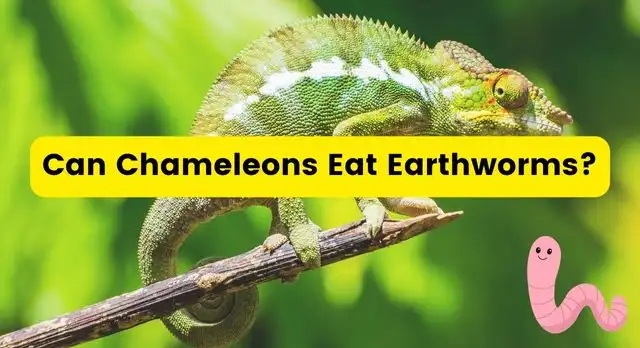Can Chameleons Eat Earthworms? Exploring Chameleon Diets
Chameleons are captivating creatures known for their ability to change colors and their unique physical adaptations. When it comes to their diet, chameleons are primarily insectivorous, feeding on a variety of small invertebrates. However, you may wonder if chameleons can eat earthworms. In this article, we will delve into the topic of chameleon diets and explore whether earthworms are a suitable food source for these remarkable reptiles.

Chameleon Diets: An Overview
Chameleons have specialized dietary needs that reflect their unique biology and behavior. In the wild, different species of chameleons have varying preferences for specific insects and small invertebrates. Their diets often consist of:
- Crickets
- Grasshoppers
- Flies
- Moths
- Beetles
- Butterflies
- Spiders
These small prey items provide chameleons with essential nutrients, such as protein, vitamins, and minerals, which are crucial for their growth and overall health. Chameleons use their remarkable tongue projection to capture prey, which they grasp with their strong jaws.
Can Chameleons Eat Earthworms?
Yes, chameleons eat earthworms and this worm are beneficial for their health also keep in mind there are lot off different types of worms available that can hurt your chameleons so give them only earthworm
While chameleons primarily feed on insects, some chameleon species have been observed consuming earthworms in captivity. However, it is essential to consider a few factors before introducing earthworms into a chameleon’s diet:
- Size and Species: Earthworms are generally larger than the typical prey items chameleons consume. Young or smaller chameleons may find it challenging to eat larger earthworms. It is crucial to choose earthworms that are appropriately sized for the chameleon’s mouth and digestive capacity.
- Nutritional Value: Earthworms provide a different nutritional profile compared to the insects that chameleons naturally consume. While they are a good source of protein, they may not offer the same variety of essential vitamins and minerals that insects provide. It is important to ensure that the chameleon’s nutritional needs are met through a balanced diet.
- Digestive System: Chameleons have specialized digestive systems adapted for processing insects. Earthworms have higher moisture content and different fiber content compared to insects, which may affect the chameleon’s ability to digest them effectively. Observing the chameleon’s response to earthworms and monitoring its digestion is crucial to ensure that it can process this type of food properly.
A Balanced Diet for Chameleons
To ensure the optimal health of your chameleon, it is recommended to provide a varied and balanced diet that closely mimics what they would consume in the wild. This includes a variety of appropriately sized insects, such as crickets, grasshoppers, and flies. Additionally, supplementing their diet with calcium and vitamin D3 is essential for proper bone development.
A combination of live insects, gut-loaded with nutritious food, and commercially available reptile supplements can help provide the necessary nutrients for chameleons. It is advisable to consult a reptile veterinarian or an experienced chameleon keeper to determine the best diet plan for your specific chameleon species.
Key Takeaway
While some chameleon species have been observed eating earthworms in captivity, their primary diet consists of small invertebrates such as insects. Earthworms can be offered as an occasional treat, but it is important to consider the chameleon’s size, nutritional needs, and digestive capabilities. Providing a balanced diet that closely resembles their natural prey items is crucial for the overall health and well-being of chameleons. Consultation with an expert and careful observation of the chameleon’s response to different foods are key to maintaining a healthy diet for these fascinating reptiles.
In conclusion, chameleons can eat earthworms, but they should not be a primary food source. Offering a varied diet of appropriately sized insects and providing proper supplementation ensures that chameleons receive the necessary nutrients for their optimal health and longevity.
Can I feed my chameleon earthworms?
Yes, you can feed your chameleon earthworms, but it’s important to do so in moderation. Earthworms should not be the sole food source for your chameleon, as they have different nutritional value compared to the insects they typically eat. Earthworms can be offered as an occasional treat to add variety to their diet.
How do you feed chameleon worms?
To feed your chameleon worms, ensure that the worms are appropriately sized for your chameleon’s mouth and digestive capacity. You can place the worms in a separate feeding dish or hand-feed them to your chameleon using tweezers. It’s essential to observe how your chameleon responds to the worms and monitor their digestion to ensure they can process them properly.
How many worms does a chameleon eat?
The number of worms a chameleon eats can vary depending on factors such as the chameleon’s size, age, and species. It’s important not to overfeed worms to your chameleon as they should be part of a balanced diet that includes other insects. Offering a few worms once or twice a week can be suitable, but it’s best to consult with a reptile veterinarian or an experienced chameleon keeper to determine the appropriate feeding frequency for your specific chameleon.
